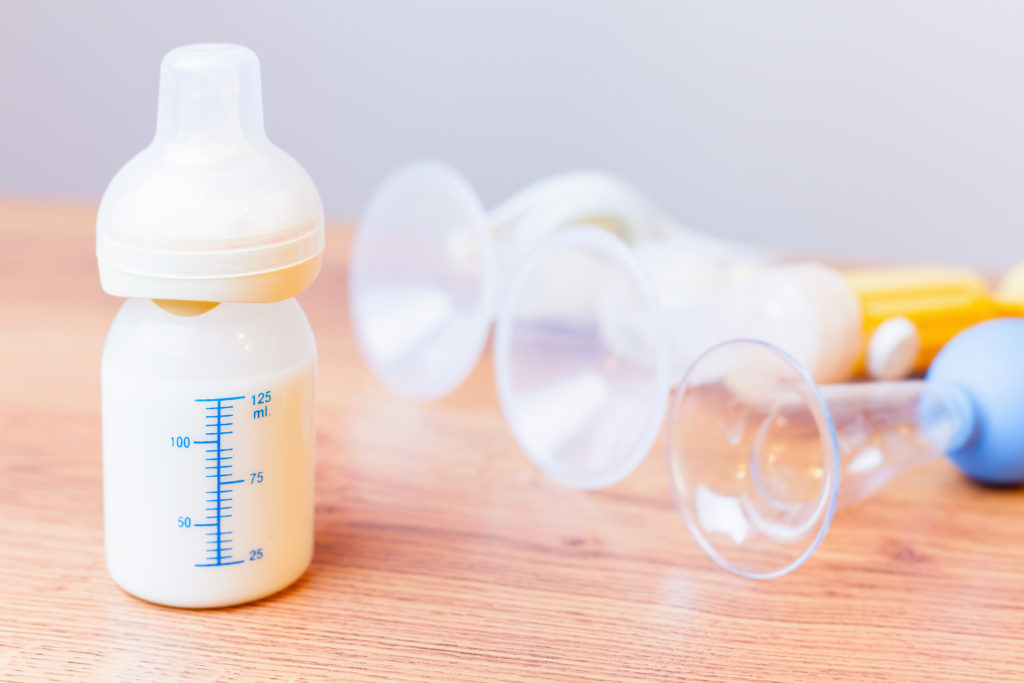The breastfeeding relationship between a mother and baby is sensitive and powerful at once. This nourishing journey ebbs and flows, with moments where you’ll wonder if you’re really doing your best and others where you’ll feel like a strong and powerful mother. Supply issues cause heartache for many mothers who wonder if their baby is truly getting enough to eat. If your breasts are feeling emptier than they had felt a few days post-partum, how are you to know whether or not it’s a normal stage of breastfeeding or something more troublesome?
Colostrum and Engorgement
When your baby is first born, your breasts will likely still feel soft and produce a clear, yellow-hued fluid called colostrum. Colostrum, lovingly referred to as “liquid gold” by Labor and Delivery Nurses and OB-GYNs alike, is filled with immune-boosting antibodies and bacteria-fighting leukocytes. Colostrum also coats your newborn’s digestive tract, protecting your infant from an irritated stomach and bowel issues. While in the beginning your breasts won’t feel full, continue to put your baby to the breast, ensuring that they’ve got an effective latch and that you can hear them occasionally swallowing. In the first week of your infant’s life, they will likely nurse in short bursts as their stomach is somewhere between the tiny sizes of a marble and a ping-pong ball. Remember, the more your baby nurses, the sooner your richer, creamier breast milk supply will establish.
Between the second and sixth day post-partum, your breast milk will “come in” or become more abundant. For some women, this experience is associated with an itching or tingling sensation and heavier breasts. Other women feel their breasts enlarge to the point of complete discomfort, as though they’re about to erupt. This phenomenon is known as “engorgement” and occurs as a result of the extra blood that’s accumulated around the milk glands. This blood supplies your breasts with enough nutrients to produce plenty of milk, which also adds to the engorgement. Prevent engorgement by allowing baby to finish nursing on one side before switching to the other breast. Most importantly, nurse as soon as possible after your baby is born, and do so often. Nurse on demand, watching for your baby’s subtle cues that they are hungry.
If You’re Nursing On Demand, “Empty” Breasts Mean an Established Supply
To understand why your breasts may feel empty, let’s explore the concept of “nursing on demand.” Nursing on demand, or on cue, means watching your baby for those small signs that they are hungry rather than watching the clock. Some early hunger signs include sucking on their hands, smacking their lips, or rooting toward their mother’s breasts. For a better start to nursing, try to notice these signs before your baby is actively hungry, fidgeting, fussing, and crying.
What you’ll find is that after your engorgement or heavy-breasted feelings have passed, you’ll feel as though your breasts are empty. This usually happens within six to eight weeks post-partum. If you’re nursing on demand, it’s likely that this empty feeling is an indicator of an established milk supply.
What is an “Established Milk Supply?”
An established milk supply is hard to define because all women have separate nursing experiences. However, for most women, an established milk supply means that your infant is satisfied after each feeding and both breasts of your breasts feel comfortable and lighter after nursing. You’ll still have episodes of heavy breasts or engorgement, especially if you’re away from your baby for more than a few hours. Your baby will still have feedings where they just don’t seem satisfied or are experiencing gassy discomfort which makes nursing frustrating for a feeding or two. Continue to nurse on demand and your breast milk supply will establish and maintain itself.
Signs that Your Baby is Getting Enough Milk
When your baby is done nursing, you can look for the following signs of satiety in your baby:
- Sleepiness, usually resulting in your baby falling off your breast with a few drops of milk around their lips
- Your newborn is nursing between eight to twelve times a day
- Their skin is plump and full of color
- Two to six wet or soiled diapers per day
- Your baby has regained their birth weight by ten to fourteen days
Easy Ways to Improve and Maintain Supply
If you’re worried about your breast milk supply, here are a few tricks you can try to build a more abundant supply:
- Drink Mother’s Milk Tea two to three times daily, with honey for a little extra sweetness.
- Take two capsules of fenugreek three times daily. Many women find that combining Mother’s Milk Tea with this supplement greatly increases their supply. Fenugreek is also sweet smelling, giving your skin a light aromatic hint of maple syrup.
- Have a “nurse in.” Spend a day in bed with your baby, watching fun movies, eating healthy foods, and drinking plenty of water. Wear a loose-fitting shirt and allow your baby to nurse as often as they would like.
- If you’re using a pacifier, consider stopping. Maintaining a well-established milk supply means allowing your baby to suckle as often as they’d like. A pacifier may interfere with nursing and even your baby’s growth rate.
When in Doubt, Call a Lactation Specialist
If you’re ever unsure about your baby’s nursing habits or your personal milk supply, seek out help from a lactation consultant or your primary health care provider. An expert may be able to sort out any issues you may have missed! Remember, true supply issues are very rare, and with a little practice, you and your baby will protect a healthy milk supply.




Leave a Reply